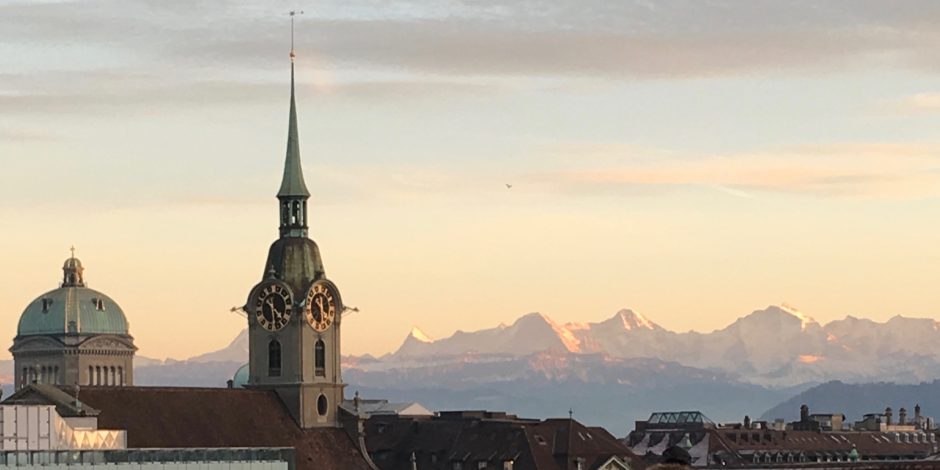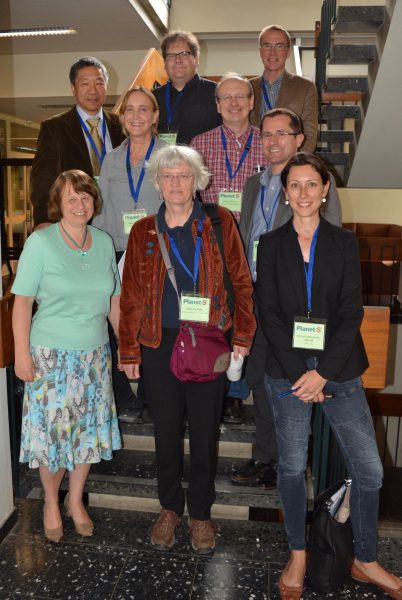Preparing the Site Visit


The review panel at last year’s site visit at the Geneva Observatory: Front (f.l.t.r.): Prof. Ewine F. van Dishoeck, Sterrewacht Leiden, NL, Prof. Imke de Pater, University of California at Berkeley, US, Prof. Anna Fontcuberta i Morral, SNSF, Abteilung Programme, EPF Lausanne
Middle: Prof. Debra Fischer, Yale University, US, Prof. Jamie Gilmour, The University of Manchester, UK, Prof. Frank Scheffold (Chair), SNSF, Abteilung Programme, Universität Freiburg
Back: Prof. Douglas N C Lin, UC Santa Cruz, US, Prof. Larry R. Nittler, Carnegie Institution of Washington, US, Prof. Simon Lilly, SNSF, Abteilung Mathematik, Natur- und Ingenieurwissenschaften, ETH Zürich (Photo: Guido Schwarz)
On 8 and 9 June 2017, the international review panel will visit PlanetS at the University of Bern. Besides a summary of the past achievements, the NCCR will present its visions for the next phase that should start in June 2018.
A new site visit is on the horizon! After Geneva Observatory last year, this year we return to the University of Bern. PhD students, postdocs and senior scientists should attend the event on the first day (Thursday, June 8), whereas on the second day (Friday, June 9) only project leaders, the programme office, and selected people from platforms need to be present. The format closely follows the one of the two previous site visits. «But this year the focus is different, » says Willy Benz, Director of the NCCR PlanetS: «The panel wants not only to hear about our three-year achievements but also to discuss with us about our preproposal for PlanetS in the phase running from 2018 to 2022».
Willy Benz already summarized the main parts of the new vision during this year’s General Assembly in Grindelwald. The 134-pages pre-proposal describing it in more detail was submitted to the Swiss National Science Foundation at the end of February 2017. Now the PlanetS Director is curious about the reaction of the international experts. «During the site visit they may criticize aspects, ask for some changes, or approve our plans enthusiastically… We are quite eager to hear what they have to say» says Willy Benz. While we will get some oral feedback immediately after the meeting, the official report will come during the summer.
Taking the feedback into account, a full proposal will then be submitted (end of February 2018) with a final decision expected shortly before the end of phase 1 (end of May 2018).
Core, steady state or bonus
As far as the level of resources is concerned, PlanetS leaders will have to wait a bit longer to know which of the three funding options that had to be presented in the pre-proposal will finally be approved by SNSF. These three options were: a steady state programme with a budget equivalent to the one in phase 1, a core programme with 20% less money and a bonus programme with 20% more. «The core programme was defined by identifying those activities that, if cut, would have the least detrimental impact on the programme and on international commitments» the report summarizes. The bonus programme on the other hand focuses on a single theme: habitability. While key elements of habitability are part of the steady-state programme, the bonus programme extends this work to include important aspects that are sometimes risky but can have potentially large pay-offs.
«The preliminary go-ahead only includes the 80% budget,» explains Willy Benz: «For the additional funding a competition amongst the same generation of NCCRs will take place.» Besides PlanetS, 7 other NCCRs started in 2014 which are now going through the same process as us. Their topics range from migration and mobility studies to bio-inspired materials or digital technologies in architecture. To promote quality, SNSF decided to introduce a competition between same generation NCCRs in which the winners get 20% more while the losers are cut by 20%… Needless to mention which category we are aiming at!
For more information about the SNSF site visit go to the PlanetS internal website:
http://nccr-planets.ch/event/snf-site-visit-3/
Categories: Internal Newsletter

